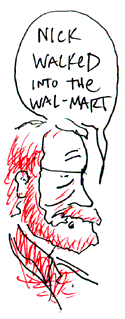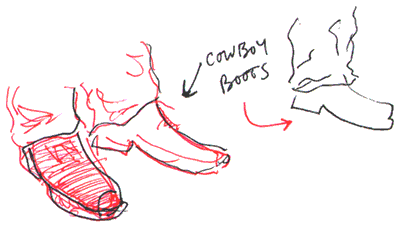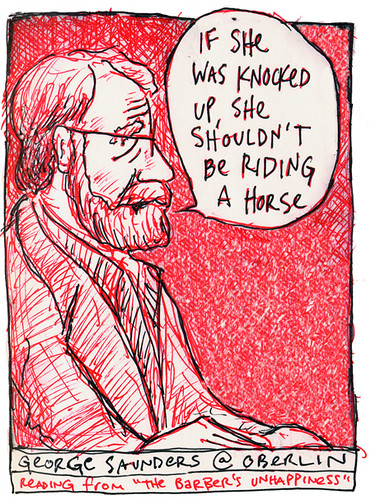We drove out to Oberlin last night to see George Saunders read. I’d been looking forward to this for about a year, and I was praying to the weather gods that there wouldn’t be a giant snowstorm in Syracuse to keep him from getting to Cleveland. (He told us later that he was delayed, and missed a connecting flight, but it was an airline thing, not a weather thing.) Meg and I had a nice dinner at the Feve, and then we walked over to the Science Center. There weren’t any fun chemistry notes on the board in the lecture hall, but there was one of those little models with the wire and balls that you use to describe molecules…
Anyways. Big crowd. Lots of kiddies. First, he read the title story from In Persuasion Nation (here’s an MP3 from another reading). He said he wrote the story after watching a bunch of TV and realizing that a) advertising had began taking credit for everything good that happened in life (“Coke is Christ”) and b) that it had gotten really mean. Then he read from one of my favorites from Pastoralia, “The Barber’s Unhappiness” (here’s a hilarious MP3 of Tony Danza reading it). He said, “After you have daughters, you start realizing how misogynist the world is.” He wrote that story after watching a real old guy from the bus stop ogling women.
The readings were funny and warm and a little ornery. I think Meg laughed more than anybody, because up until that point, she’d only heard me read “Sea Oak” aloud to her in bed.
Then it was Q & A time. Somebody asked something about racial epithets. Somebody asked about motifs. He fielded questions like a patient, pro teacher, using them as springboards to talk about craft.
He joked that all the stories in CivilWarLand were the same: “Guy’s in a bad way. It gets worse.”
 He joked about getting out from under the influence of Hemingway: “All my first stories went like this: Nick walked into the Wal-Mart.”
He joked about getting out from under the influence of Hemingway: “All my first stories went like this: Nick walked into the Wal-Mart.”
He did a hilarious high-voiced impression of Bill Buford’s method when he was fiction editor of the New Yorker: “Welll…I read a sentence…and then I like it…so I want to read another one!”
He said, “What you know is enough.”
He said good stories are “making language not suck.”
He plugged Don Barthelme’s great essay, “Not-Knowing.”
He described Joyce Carol Oates on her treadmill, thinking through her stories.
He recalled working in MS-DOS at his office, and using shift-F3 to avoid being caught writing on the job.
He outlined an editing method he uses with his students. First, he gives them 500 words of crap. Then they take a few minutes and cut 20 words. Then they take a few more minutes and cut 50 words. They do this a few more times until they have the crap whittled down to 200 words. The excercise is about finding voice in the appropriate “Prose Weight.”
Somebody asked, “What have you learned about the role of solitude in a writer’s life.” He said, “I never had any.”
Lucky me, I got the last question. I asked him, “What have you read lately that’s knocked you out?”
He said Susan Sontag and Joan Didion, two women he had never read before.
Then he started listing his old favorites. “Stuart Dybek?” I nodded. “Oh, you know him. How about Isaac Babel?” I nodded. “Stan Schwartz?” I shook my head. “Oh, no? That’s good, because I just made him up.” The room roared.
There was a long line outside to get books signed. We finally got to shake hands and say hello. “So, I take it you two are writers.” I said I was a cartoonist, and Meg was an architect. “Smart man!” he said. “You’re the guy who’s read everything.” I said, “No, only your reading list.”
Then we talked about Vonnegut. I mentioned the Amazon piece, and he said he’d re-worked the ending and that it would be in a new book soon. (I’m wondering if that new book is The Braindead Megaphone.) He said he just had a piece in the New York Observer proposing a National Vonnegut Day.
Then, we talked a little bit about Lynda Barry and how awesome she was. He said she came and taught at Syracuse and that she’d given him these really interesting articles on how the brain processes lyric poems, short stories, and jokes in the same way, as in, after you hear them, the brain runs back through them and gets its satisfaction from their shapeliness. She also told him about how they’d studied artists and creative people and figured out their patterns of childhood play. Next time I’m working, I’ll have to try to dig those up.
We said our goodbyes, and on the way home, Meg and I talked about how nice a guy he was, and how much we loved going to readings like this.


Did Saunders mention anything about Buddhism?
no, but he’s talked about it in a lot of his interviews…in fact, I think I sent you one
“You know enough.” Writing is about exploring questions. Feeling what’s bothering you. Writing is like having a tooth pulled at the dentist and exploring the gap with your tongue. He’s soooo right. You know enough.
I really liked that quote, too. it’s so easy to get stuck thinking about plot and character and all that jazz, and forget that the biggest thing is to keep tackling your QUESTIONS. what bothers you, what makes you uncomfortable, etc.
Thanks, Austin, for talking about an interesting author once again. You have directed me towards such interesting work – I’m still reeling from the Ecstasy of Influence by Jonathan Lethem – so I’d like to point you to a NY Times article about an exhibit in NYC about Picasso Braque and the early cinema.
“For more than 20 years the New York art dealer Arne Glimcher had carried around a theory, more gut feeling than scholarly conjecture, that Picasso and Braque had been seduced by that siren song of the early cinema, and that Cubism, with its fractured surfaces and multiple perspectives, owed much more to the movies than anyone had noticed.”
to see the entire article (sorry its such a long link) http://www.nytimes.com/2007/04/15/arts/design/15kenn.html?ex=1177560000&en=58eaccd90a30bc1a&ei=5070&emc=eta1
hey liza! thanks for the article. this line cracked me up:
“Il n’y a pas de Cubisme,??? [Picasso] said blithely, and then excused himself to go feed his pet monkey.